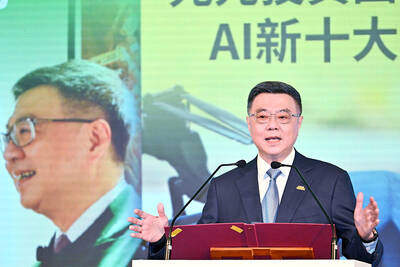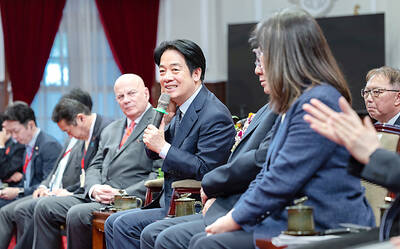Taiwan could share real-time intelligence with the US and Japan through naval reconnaissance drones, the Financial Times reported yesterday, citing four sources familiar with the matter.
US-based defense contractor General Atomics is to deliver four MQ-9B Sea Guardians starting in 2025.
The uncrewed aerial vehicles (UAV) — a navalized version of the Reaper drones used by the US Air Force in recent campaigns — are designed to detect ships and radars, the newspaper reported.

Photo: EPA
These functions could be key to defending Taiwan against a hypothetical Chinese attack, as the Chinese People’s Liberation Army (PLA) is likely to include surface combatants and submarines, it said.
The drones would enable a common operational picture to be formed by Taiwan’s armed forces, the US and regional allies, it said, referring to the practice of sharing an identical and continuously updated set of information across multiple commands.
“We will be taking a practical approach towards ensuring that integration is done as quickly as possible,” a source briefed on the project was quoted as saying.
The sharing of data between Taiwan, the US, Japan and the Philippines would be a crucial capability, but one that Beijing deems to be among its “big taboos,” a senior US defense official told the Financial Times. “China will see it as escalatory.”
“The MQ-9 is a relatively new system to this theater, and we have tried very hard to begin to develop an M-Q9 web of orbits with our partners out here — much like we have in the Middle East, Africa and other places in Europe,” former US Marine Forces Pacific commander Steve Rudder was quoted as saying.
Following the fielding of the UAVs by the US Air Force in Hawaii and in Japan alongside the Japanese navy and coast guard, the alliance would “begin to explore how to build a common operational picture,” he was quoted as saying.
However, the Ministry of National Defense yesterday wrote on Twitter that it has “not yet been informed of plans to share real-time data from naval reconnaissance drones with the US and Japan.”
The MQ-9B’s high-altitude and loiter capabilities “absolutely justify” the price tag of the US-made drones, National Drone Industry Association chairman Max Lo (羅正方) said.
Taiwan’s acquisition of the UAVs would mean the nation could share intelligence with US naval forces in the Pacific region and other democratic partners, allowing the conduct of precision strikes against the PLA, he said, speaking about a hypothetical conflict.
The procurement of four drones is insufficient for Taiwan’s defense, which requires a strong indigenous UAV industry, he said.
Taipei needs to allocate a larger share of the defense budget for the growth of the drone sector, integrate the nation’s supply chains, and strengthen research and development capabilities, Lo said.
US drones are proven systems with high reliability and a guaranteed supply of parts, but Washington could place limits on exported drones, a defense official said on condition of anonymity.
Foreign operators could face constraints on the type and quantity of munitions that could be supplied, availability of maintenance services and being prevented from using some flight paths, they said.
Washington might demand Taiwan’s military to exclusively depend on US contractors for maintenance and upgrades, to prevent reverse-engineering, they said.
These tradeoffs make domestic drones worthwhile, even if they are less reliable than the US counterpart, they said, adding that Taiwanese systems are one-fifth of the cost of US units.
Separately, Institute of National Defense and Security Research fellow Su Tzu-yun (蘇紫雲) said that fielding MQ-9Bs would significantly boost the reconnaissance, communication, and command and control of the armed forces.
MQ-9Bs could function as flying command and control nodes if Taiwanese radar stations are knocked out by enemy action, he said.
The UAV deal with the US includes 14 sets of navigation systems, 10 of which are spares that can potentially be installed in the domestically manufactured Teng Yun UAV, Su said, adding that this would be tactically advantageous.

Two US House of Representatives committees yesterday condemned China’s attempt to orchestrate a crash involving Vice President Hsiao Bi-khim’s (蕭美琴) car when she visited the Czech Republic last year as vice president-elect. Czech local media in March last year reported that a Chinese diplomat had run a red light while following Hsiao’s car from the airport, and Czech intelligence last week told local media that Chinese diplomats and agents had also planned to stage a demonstrative car collision. Hsiao on Saturday shared a Reuters news report on the incident through her account on social media platform X and wrote: “I

STILL ON THE TABLE: The government is not precluding advanced nuclear power generation if it is proven safer and the nuclear waste issue is solved, the premier said Taiwan is willing to be in step with the world by considering new methods of nuclear energy generation and to discuss alternative approaches to provide more stable power generation and help support industries, Premier Cho Jung-tai (卓榮泰) said yesterday. The government would continue to develop diverse and green energy solutions, which include considering advances in nuclear energy generation, he added. Cho’s remarks echoed President William Lai’s (賴清德) comments in an interview last month, saying the government is not precluding “advanced and newer nuclear power generation” if it is proven to be safer and the issue of nuclear waste is resolved. Lai’s comment had

‘BUILDING PARTNERSHIPS’: The US military’s aim is to continue to make any potential Chinese invasion more difficult than it already is, US General Ronald Clark said The likelihood of China invading Taiwan without contest is “very, very small” because the Taiwan Strait is under constant surveillance by multiple countries, a US general has said. General Ronald Clark, commanding officer of US Army Pacific (USARPAC), the US Army’s largest service component command, made the remarks during a dialogue hosted on Friday by Washington-based think tank the Center for Strategic and International Studies. Asked by the event host what the Chinese military has learned from its US counterpart over the years, Clark said that the first lesson is that the skill and will of US service members are “unmatched.” The second

STANDING TOGETHER: Amid China’s increasingly aggressive activities, nations must join forces in detecting and dealing with incursions, a Taiwanese official said Two senior Philippine officials and one former official yesterday attended the Taiwan International Ocean Forum in Taipei, the first high-level visit since the Philippines in April lifted a ban on such travel to Taiwan. The Ocean Affairs Council hosted the two-day event at the National Taiwan University Hospital International Convention Center. Philippine Navy spokesman Rear Admiral Roy Vincent Trinidad, Coast Guard spokesman Grand Commodore Jay Tarriela and former Philippine Presidential Communications Office assistant secretary Michel del Rosario participated in the forum. More than 100 officials, experts and entrepreneurs from 15 nations participated in the forum, which included discussions on countering China’s hybrid warfare